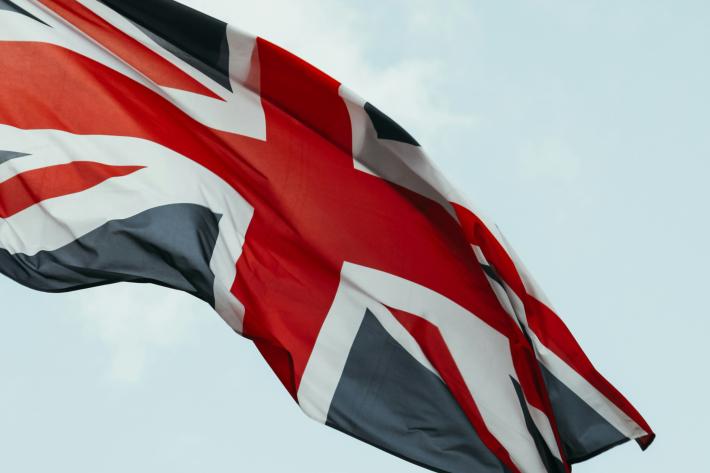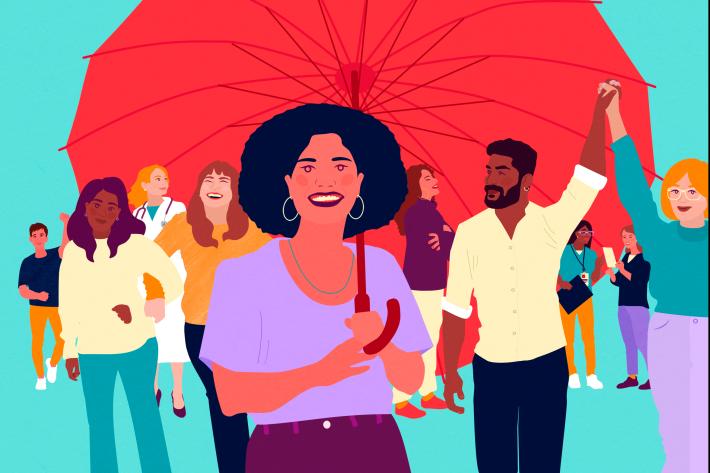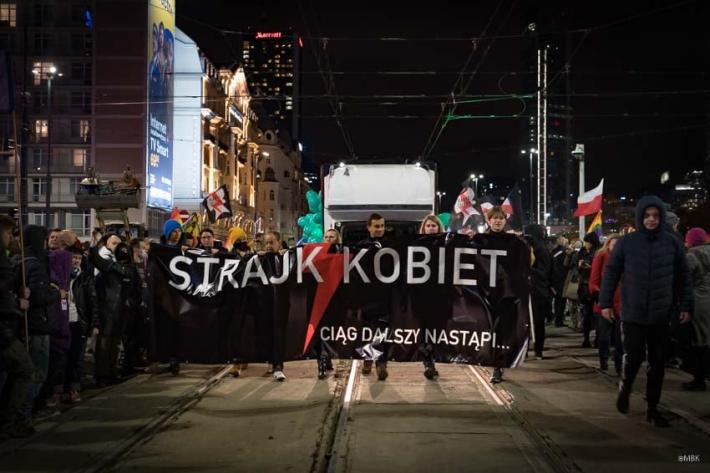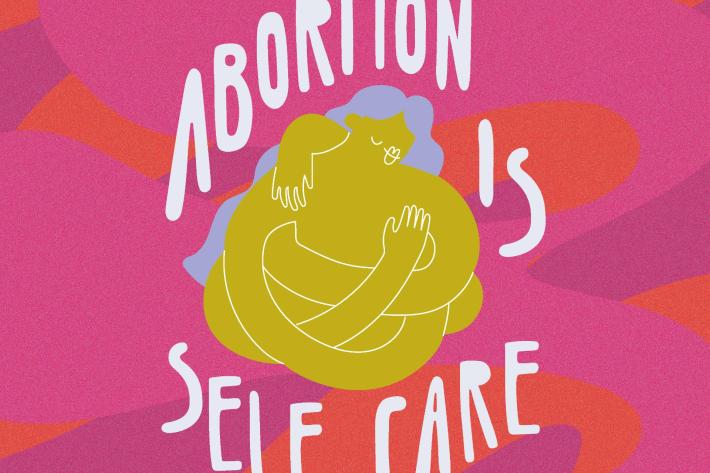
Spotlight
A selection of news from across the Federation

European Commission's new Women's Rights Roadmap includes SRHR—Now we need action
On 7 March, the EC released a new political declaration committing to uphold and advance women's rights. We welcome the inclusion of SRHR and other key topics. Now impactful actions are needed.
Filter our news by:


| 12 March 2025
European Commission's new Women's Rights Roadmap includes SRHR—Now we need action
On 7 March 2025, the European Commission released its new Roadmap for Women’s Rights - a political declaration that reaffirms its determination to uphold gender equality and sets out a long-term vision for how it will advance women’s rights. IPPF EN welcomes this crucial commitment at a time when ultraconservative movements are gaining influence in the EU and around the world, threatening progress on women's rights, including their sexual and reproductive health and rights (SRHR). We particularly value the inclusion in the Roadmap of the following key commitments, which are at the heart of our demands to the EU: 1. Highest Standards of Health The Roadmap reiterates that every woman has the right to the highest attainable standards of physical and mental health, with notably a focus on SRHR. It commits to supporting and complementing health action by Member States in this field, in full respect of the Treaties. IPPF EN strongly supports this inclusion of SRHR in the Roadmap, by which the European Commission highlights that SRHR are women’s rights and part of EU values. But it is important to note that SRHR are not only a health issue – they are also fundamental rights intertwined with the clear EU priorities of achieving gender equality and fighting against sexual and gender-based violence. We urge the EU to take bold, actionable steps in the upcoming Gender Equality Strategy to implement international commitments, international human rights and public health standards on SRHR, and ensure that Member States guarantee access to comprehensive SRHR services for all in the EU, including safe and legal abortion. Other objectives in the Roadmap include ensuring respectful and high quality obstetric, gynaecological, antenatal, childbirth and postnatal care, free from discrimination and harmful practices; promoting gender-sensitive medical research, clinical trials, diagnostics and treatments; and ensuring access to affordable menstrual hygiene products and contraception. IPPF EN welcomes the prioritisation of obstetric care, of which access to abortion care is an integral part; and calls for the recognition and combating of all forms of obstetric and gynaecological violence, including mistreatment during and denial of abortion care. 2. Freedom from Gender-Based Violence The Roadmap outlines actions to combat all forms of violence against women and girls, including sexual violence and rape, based on lack of consent, and to ensure support and protection for victims of violence. IPPF EN urges Member States to provide access to sexual and reproductive healthcare services to victims of sexual violence, which should be free of charge, sufficiently resourced and accessible at all times and throughout the country, in line with the EU Directive on Violence Against Women. 3. Comprehensive Sexuality Education We strongly welcome the inclusion of comprehensive sexuality education promotion in the Roadmap. Comprehensive sexuality education, which includes consent education, is essential for enabling young people to form happy, healthy, and safe relationships free from violence and discrimination. 4. Institutional Mechanisms and Funding The Roadmap stresses the need for strong institutional mechanisms and sustainable funding for gender equality policies and women’s rights organisations. IPPF EN calls for the priorities outlined in the Roadmap, and the forthcoming Gender Equality Strategy, to be adequately funded, particularly in light of the upcoming negotiations on the EU Multiannual Financial Framework. A strong women’s rights movement is the most effective way to counter threats of retrogression. The EU should increase its protection and political and financial support to organisations and human rights defenders who fight for women’s rights, including SRHR. 5. Intersectionality The Roadmap recognizes the importance of addressing intersectional discrimination, but we regret the omission of ‘gender identity’, ‘sexual characteristics’, and ‘migration status’ as discrimination grounds. We call on the EU to address the specific needs of trans, non-binary, intersex, and migrant and undocumented women, who face unique challenges. “It is a welcome first step that SRHR and other crucial topics have been included in the Roadmap for Women’s Rights. The Roadmap should now pave the way for the new EU Gender Equality Strategy post-2025 and be followed up with impactful actions. We stand ready to work with the European Commission and Member States to transform these principles into reality,” said Micah Grzywnowicz, IPPF EN Regional Director. Image credit: Fátima Bravo for Fine Acts
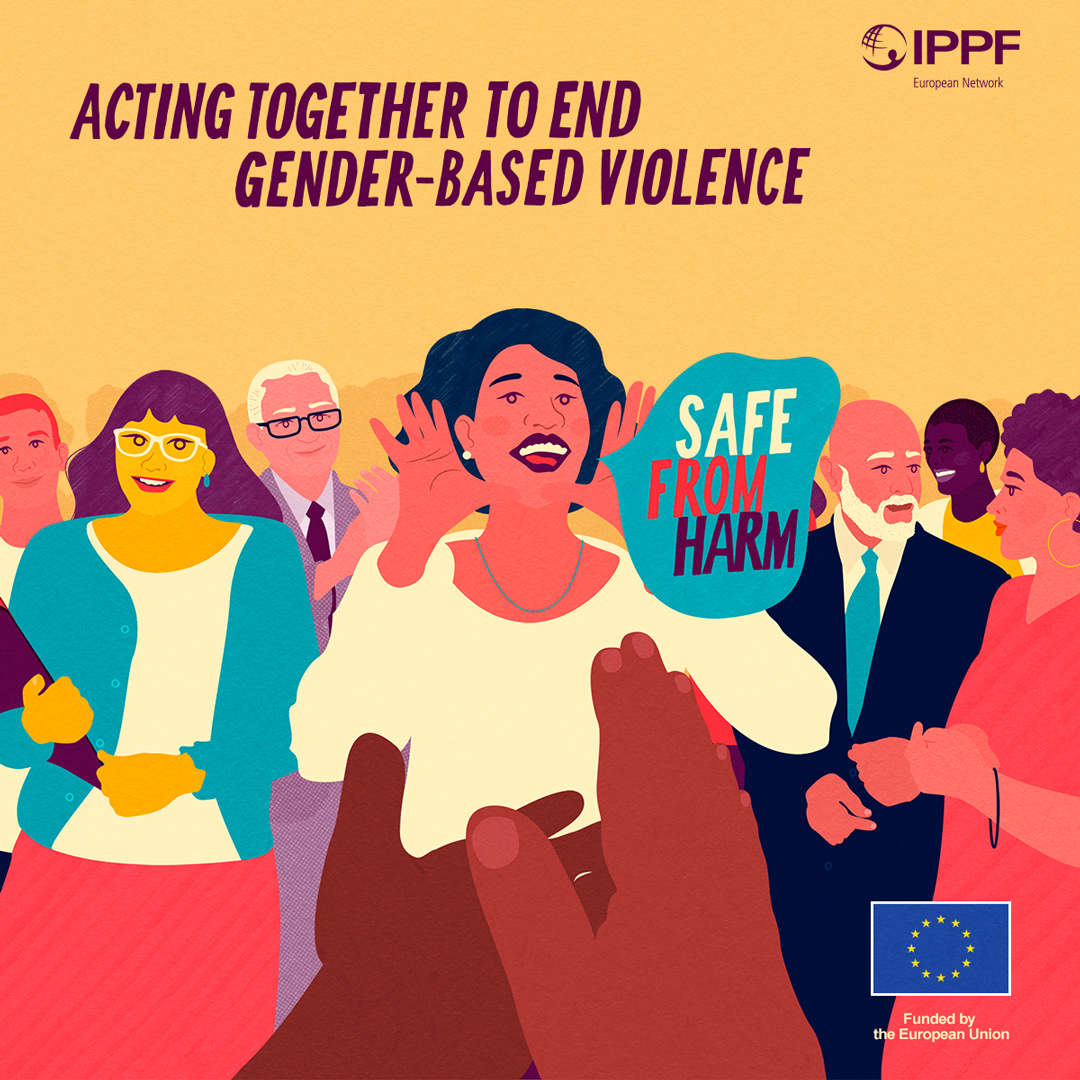
| 25 January 2024
Civil society calls for a robust EU Directive on violence against women and domestic violence
On 24 January, as final negotiations on the EU Directive on combating violence against women and domestic violence are taking place, IPPF EN and 11 other NGOs called on negotiators to take effective action and ensure that a robust Directive is urgently adopted. An open letter to negotiators in the Belgian Presidency of the Council of the European Union, Member States, the European Parliament and the European Commission ahead of the final negotiations of this mandate on the Directive on combating violence against women and domestic violence (COM (2022) 105 final, 8 March 2022) We are writing as concerned organisations[1] that advocate for human rights, gender equality, and the right for all to live free from violence. As we have entered the final weeks of European Union institutions’ ability to negotiate legislative files before the next European elections, we call on European governments to level up and take effective action to combat violence against women and domestic violence by urgently adopting a robust Directive. We welcome this proposed Directive, as it provides much needed comprehensive responses, incorporating prevention, protection, support for victims and prosecution for a range of criminal offences which constitute violence against women and domestic violence. The adoption of this Directive is, however, endangered due to several Member States’ failure to agree to strengthen laws and policies at the EU level and endorse crucial measures supported by the European Commission and the European Parliament, as well as by diverse civil society organisations across Europe. If agreement is not reached in the next weeks, there are serious risks of this proposal being further weakened or not adopted at all under the next mandate of the European Parliament. This would leave women and other people affected across the EU without adequate protection from gender-based and domestic violence. We urge national governments to transform lip service to ending violence against women into concrete and effective action against this scourge that affects millions in the EU, including by ensuring that rape based on lack of consent is a criminal offence across the EU. We have been dismayed to see Member States propose rejecting the unprecedented opportunity to criminalise rape in this Directive. It is utterly unacceptable that some Member States are stubbornly unresponsive to the need to combat rape across the EU, hiding behind restrictive legal interpretations on EU competences. Sexual violence against women is endemic across the EU, with widespread impunity. Consent-based definitions have proven to guarantee greater protection and access to justice for women and other victims of rape, including increased reporting and prosecution rates. We urge governments to act in accordance with their international and regional human rights obligations, particularly under the Istanbul Convention, and agree on the most robust Directive possible to prevent, prosecute and redress violence against women. Therefore, as organisations closely engaged on the issues at hand, we call on Member States to ensure that the Directive criminalises rape with a consent-based definition, as well as female and intersex genital mutilation, forced sterilisation, forced marriage, and sexual harassment in the workplace. It should combat violence on grounds of sex and gender, and address intersectional discrimination, with specific attention paid to LBTIQ+ women, women sex workers, and women who are undocumented migrants or have an insecure or dependent residence status. We call for strengthened protection and access to justice for victims, including access to compensation and safe reporting mechanisms through the establishment of strict firewalls between immigration and other authorities to ensure survivors are not deterred from reporting violence due to their residency status. The Directive should further guarantee comprehensive support to victims and access to both general and specialist support services, including the clinical management of rape and comprehensive sexual and reproductive health care for victims of sexual violence, as well as support for child victims. We also call for the adoption of widespread and effective preventive measures, including a clear obligation to provide comprehensive sexuality education. For more detailed recommendations, we refer to our joint position published in 2023. There are times when political decisions can make a profound difference to millions of people’s lives. This is one of them. Member States have an opportunity to enact a Directive that can be truly transformative. We call on you to show courage and leadership and grab this opportunity. Sincerely, International Planned Parenthood Federation – European Network (IPPF EN) Amnesty International Center for Reproductive Rights End FGM European Network EuroCentralAsian Lesbian* Community (EL*C) European Sex Workers Rights Alliance (ESWA) Human Rights Watch La Strada International, European NGO Platform Against Trafficking in Human Beings Organisation Intersex International Europe (OII Europe) Platform for International Cooperation on Undocumented Migrants (PICUM) The European region of the International Lesbian, Gay, Bisexual, Trans and Intersex Association (ILGA-Europe) Transgender Europe (TGEU) [1] Our organisations work on a diverse range of women’s rights issues. In the drafting of this document, we have been led by the expertise of women’s rights organisations and women human rights defenders from communities most impacted by the specific forms of violence described in each section. Our commitment to the text represents our coming together as a collective with shared values, even though not every organisation has its own policy or programme of work dedicated to each issue. We centre and affirm the expertise of women human rights defenders in all their diversity, and encourage the European Commission, the European Parliament, and the Council of the EU to do the same.

| 16 July 2021
Podcast episode 4: Gender and The Union
Gender and The Union is a podcast exploring why policy changes matter to combat gender-based violence in the European Union, and why relationship and sexuality education is key to creating a more equal and safe future for all. In this 4-episode podcast series, we will create a dialogue between policy makers in the EU and the young people looking to advocate for positive change. In this episode of Gender & The Union we discuss how the European Union and the government of Serbia prevent gender-based violence and fight inequalities, with Ms. Leonetta Pajer, head of Operations at the EU Delegation in Serbia and Gala, 16 years old and youth activist from Serbia. The podcast is moderated by Catherine Bailey Gluckman, programme advisor for youth work at IPPF EN. We have heard how gender equality, human rights, and relationship and sexuality education play an important role in the candidature of Serbia to the EU and how the EU and Serbia are working together to achieve a world free from sexism, violence and all forms of discrimination. Above all the relationship between the EU and Serbia should be a partnership that aspires to fulfil the hopes of young people like Gala. On her side, Gala has shared her expectations following the EU accession process, what progress she hopes to see on gender equality in Serbia, as well as what she is personally doing to better the lives of young people who want access to relationship and sexuality education, and who deserve a future where inequalities are diminished and harmful gender norms are a thing of the past. Quality relationship and sexuality education is necessary to ensure that young people live out the principles of gender equality but policy changes in the areas of rule of law, democracy and health are needed too. We are now looking to both the Serbian government and the EU to make this happen together with young activists like Gala and her peers. This has been the final episode in our podcast series, Gender & The Union. Don't forget to catch up on the other three episodes. This podcast series was commissioned by the International Planned Parenthood Federation European Network, produced by Positive Stories and funded by the European Union’s Rights, Equality and Citizenship Programme (REC 2014-2020), within the framework of the Youth SpectActors project. The content of this podcasts represents only the views of IPPF EN and is its sole responsibility. The European Commission does not accept any responsibility for use that may be made of the information it contains.

| 28 June 2021
Podcast episode 3: Gender and The Union
Gender & The Union is a podcast exploring why policy changes matter to combat gender-based violence in the European Union, and why relationship and sexuality education is key to creating a more equal and safe future for all. In this 4-episode podcast series, we will create a dialogue between policy makers in the EU and the young people looking to advocate for positive change. In this episode of Gender and the Union we discuss what the European Union and all of us can do to create a society free from sexism and discrimination, with the EU Commissioner for Equality, Helena Dalli and our sexual and reproductive rights youth advocate, Amanda, from Sweden. The podcast is moderated by Catherine Bailey Gluckman, programme advisor for youth work at IPPF EN. The value of gender equality is close to the hearts of European citizens – with 91% of Europeans believing that its promotion is important to ensuring a fair and democratic society. So what steps is the European Commission taking to diminish gender inequalities? Commissioner Dalli tells us about what the EU is doing to tackle intersecting discrimination and reach those whose needs are greatest. Commissioner Dalli affirms that sexual and reproductive health and rights are at the core of gender equality, speaks out in favour of relationship and sexuality education (RSE), and affirms that RSE should be an essential component of the future EU Directive on Gender-Based Violence, as a way to prevent violence. We’ve heard how things are locally and nationally in Sweden including some inspiring best practices in how Amanda works with young people to make sure they feel empowered to take decisions about their lives and challenge harmful stereotypes. Amanda has underlined very clearly that it’s not just about a good legal framework in place to ensure sexuality education is delivered, implementation is crucial. And there needs to be investment in sustainable programmes, training new educators and school teachers continuously and ensuring that curricula for sexuality education are relevant up-to-date and that they reflect enough of a range of important life skills. Finally, we also heard that there is a lot of power to prevent violence, to fight inequalities and to adopt strong relationship & sexuality education programmes within the reach of individual EU countries themselves. This does require states to seize that responsibility and do the work. But it is also empowering to realize it’s achievable. That data is out there, keen and willing educators are out there, a supportive international community of practice exists. It’s entirely within the power of EU states to make the most of these resources and do their duty to ensure the safety of young people. As Helena Dalli said, this is the way to go. This podcast series was commissioned by the International Planned Parenthood Federation European Network, produced by Positive Stories and funded by the European Union’s Rights, Equality and Citizenship Programme (REC 2014-2020), within the framework of the Youth SpectActors project. The content of this podcasts represents only the views of IPPF EN and is its sole responsibility. The European Commission does not accept any responsibility for use that may be made of the information it contains.

| 16 June 2021
Podcast episode 2: Gender and The Union
Gender & The Union is a podcast exploring why policy changes matter to combat gender-based violence in the European Union, and why relationship and sexuality education is key to creating a more equal and safe future for all. In this 4-episode podcast series, we will create a dialogue between policy makers in the EU and the young people looking to advocate for positive change. In this episode of Gender and The Union we discuss how relationship and sexuality education can be a way to prevent gender inequalities and gender-based violence, together with Predrag Fred MATIĆ, Member of the European Parliament & our youth activist, Luize. The podcast is moderated by Catherine Bailey Gluckman, programme advisor for youth work at IPPF EN. What are the challenges that young people in Latvia face when trying to access relationship and sexuality education? What is the European Parliament doing in terms of improving the lives of young people and advancing gender equality? What actions can we take to address violence against women? The answers of all this and more in this episode. We also discuss the landmark position on sexual and reproductive health and rights voted by the European Parliament right after the tapping of this episode. In this report, authored by MEP Predrag Fred Matić, the European Parliament recognised that SRHR is not only a human rights issue; it is also intrinsically linked with gender equality, women’s empowerment and combating gender-based violence. This podcast series was commissioned by the International Planned Parenthood Federation European Network, produced by Positive Stories and funded by the European Union’s Rights, Equality and Citizenship Programme (REC 2014-2020), within the framework of the Youth SpectActors project. The content of this podcasts represents only the views of IPPF EN and is its sole responsibility. The European Commission does not accept any responsibility for use that may be made of the information it contains.

| 08 June 2021
Podcast episode 1: Gender and The Union
Gender and The Union is a podcast exploring why policy changes matter to combat gender-based violence in the European Union, and why relationship and sexuality education is key to creating a more equal and safe future for all. In this 4-episode podcast series, we will create a dialogue between policy makers in the EU and the young people looking to advocate for positive change. In this first episode we discuss prevention of violence through education and dismantling harmful gender norms – with the President of the Commission for Citizenship and Gender Equality of Portugal, Sandra Ribeiro, & our youth activist from Estonia, Susan. The podcast is moderated by Catherine Bailey Gluckman, programme advisor for youth work at IPPF EN. What are the priorities of the Portuguese Presidency of the Council of the European Union when it comes to promoting EU values, including advancing gender equality and combatting gender-based violence? What are the challenges young people are facing concerning violations of gender equality and harmful practices? And how has COVID-19 impacted the lives of women and girls seeking education and safety from violence at home? These are just some of the topics we touch upon. This podcast series was commissioned by the International Planned Parenthood Federation European Network, produced by Positive Stories and funded by the European Union’s Rights, Equality and Citizenship Programme (REC 2014-2020), within the framework of the Youth SpectActors project. The content of this podcasts represents only the views of IPPF EN and is its sole responsibility. The European Commission does not accept any responsibility for use that may be made of the information it contains.









